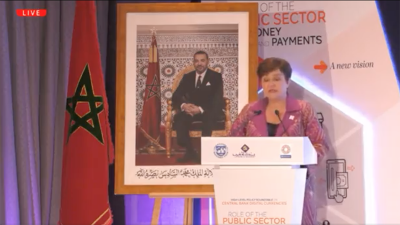Video: IMF Managing Director Says “We are working hard on a global CBDC”
“If we are to be successful, CBDCs could not be fragmented national propositions.”

All Global Research articles can be read in 51 languages by activating the Translate Website button below the author’s name.
To receive Global Research’s Daily Newsletter (selected articles), click here.
Click the share button above to email/forward this article to your friends and colleagues. Follow us on Instagram and Twitter and subscribe to our Telegram Channel. Feel free to repost and share widely Global Research articles.
***
During a presentation at a conference in Morocco, Kristalina Georgievahe the managing director of the International Monetary Fund (IMF) announced that the global body is “working hard on the concept of a global CBDC platform.”
 Georgieva declared that Central Bank Digital Currencies need to be interoperable between countries, noting “If we are to be successful, CBDCs could not be fragmented national propositions.”
Georgieva declared that Central Bank Digital Currencies need to be interoperable between countries, noting “If we are to be successful, CBDCs could not be fragmented national propositions.”
“To have transactions more efficient and fairer, we need systems that connect countries,” Georgieva continued, adding “In other words, we need interoperability.”
The IMF MD argued that global digital currencies would “give more people access to financial services and bring the cost down,” adding that “CBDCs can provide for more resilient and efficient payment systems,” and “can be a cheaper way, and a quicker way, to do cross-border payments, to pass remittances… and also simplify other transfers.”
Watch:
"At the IMF we are working hard on the concept of a global CBDC platform": IMF Managing Director Kristalina Georgieva https://t.co/Py7JLMovuc pic.twitter.com/N6txNHBaaE
— Tim Hinchliffe (@TimHinchliffe) June 19, 2023
Some have warned that a digital global currency in the hands of globalist entities could usher in a hyper-centralized “techno-Communist dystopia” allowing all purchases to be tracked and even linked to a social credit score system.
Rich Dad Poor Dad author Robert Kiyosaki recently cautioned that CBDCs would open the door for an unprecedented level of surveillance of Americans.
“By tracking every financial transaction, they will have access to every detail of our spending, the recipient of our money, and how we allocate our resources,” said Kiyosaki.
“In essence, it replicates George Orwell’s dystopian society depicted in 1984. Big Brother will be constantly monitoring our financial activity, and this is precisely the problem with central bank digital currency,” he added.
“As an individual, I become nervous at the thought of this. I do not want them to monitor my every transaction or be privy to my spending habits. It is a violation of my privacy, and they have no business knowing how I choose to allocate my resources,” the author warned.
Reflecting such concerns, Rep. Tom Emmer (R-MN) recently introduced a bill that would ban the Federal Reserve from introducing CBDCs, as well as forcing the Fed to remain transparent with Congress on its research into the issue.
CBDCs are being promoted on the basis that they will increase financial freedom, yet critics have asserted that the system would empower the state to place limits on spending and decide what people were allowed to buy.
The amount an individual could save could also be controlled via negative saving rates programmed into savings accounts.
*
Note to readers: Please click the share button above. Follow us on Instagram and Twitter and subscribe to our Telegram Channel. Feel free to repost and share widely Global Research articles.

